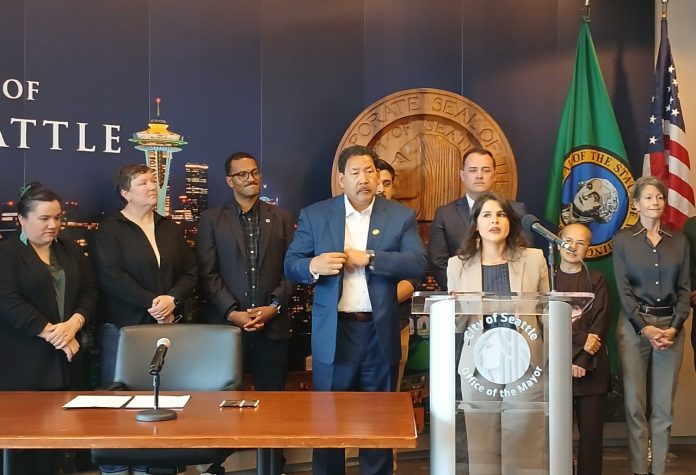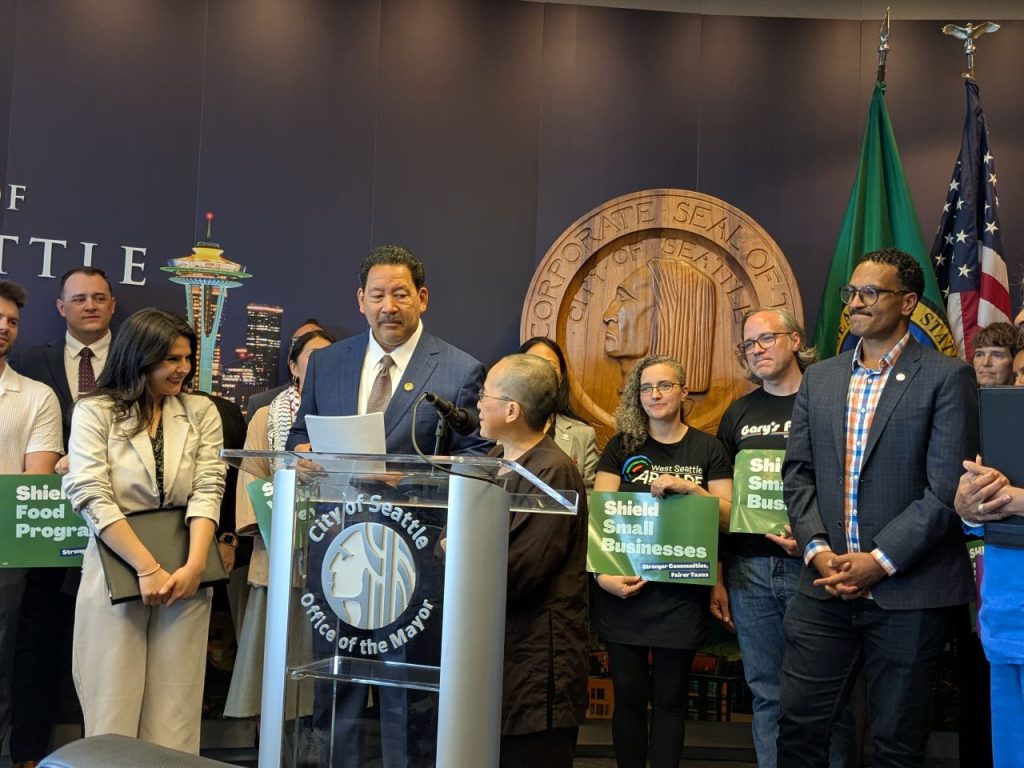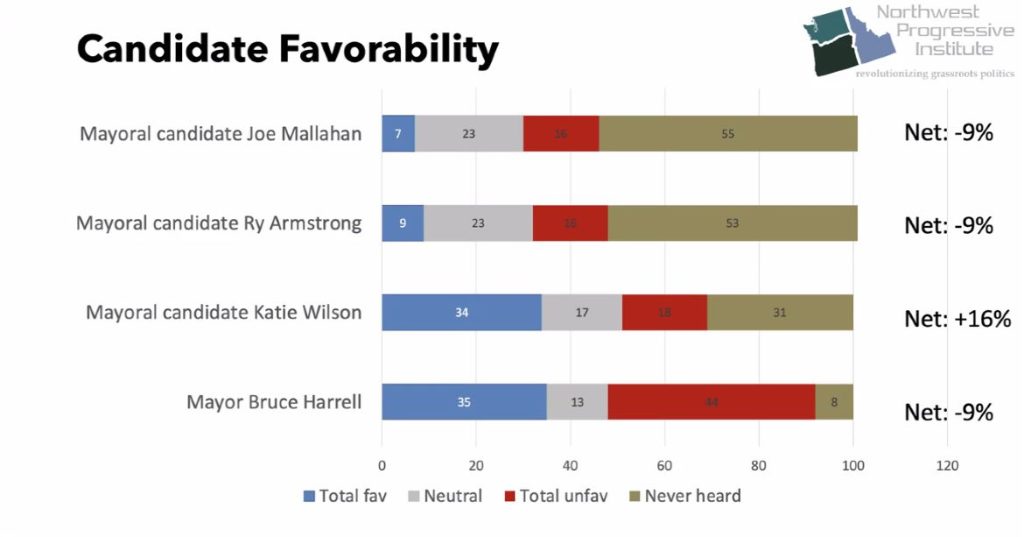
City Council watered down the Seattle Shield Initiative, but unanimously approved sending it to voters.
On Monday, the Seattle City Council voted unanimously to send the Seattle Shield Initiative, a new progressive revenue proposal, to Seattle voters this November.
Championed on council by new Councilmember Alexis Mercedes Rinck and with support from Mayor Bruce Harrell, the initiative would restructure the city’s Business & Occupation (B&O) tax in such a way that 75% of the city’s businesses would no longer have to pay the tax, with 90% paying less than they do today. The remaining 10% of businesses, those that generate more than $2 million in annual gross revenue, would pay more.
The Seattle Shield Initiative will raise an estimated $81 million in new annual revenue. The proposal calls for spending $60 million to backfill the city’s General Fund in various specified categories, while up to $20 million will be used to address the financial impacts of federal funding reductions and policy changes.
“This legislation began with three simple goals in mind,” Rinck said at a council meeting last week. “First, to shield critical city investments from cuts in a very challenging budget environment. Second, to shield small businesses from the impacts of rising costs to ensure they can continue to fuel our region’s vitality. And third, to shield our community from massive cuts in federal funding that are coming our way that will increase demand on city services from the most vulnerable of our constituents.”
As originally drafted, the initiative was intended to guarantee continued funding for emergency shelters and homelessness prevention, food access, addressing gender-based violence, and supporting small businesses and workers’ rights.
Council adds more buckets, decreases funds collected
Last week’s meeting saw council adding a host of amendments to the initiative that both increased the number of allowable uses for the funding and reduced the total amount of funds available.
During public comment, Hali Willis, the community policy manager for the Seattle/King County Coalition on Homelessness, expressed worry at such a strategy.
“We need to prepare ourselves for an influx of people relying on homelessness shelter and homelessness services when they lose their emergency housing vouchers and an influx of people relying on food banks and meal programs when they lose their SNAP benefits,” Willis said. “I’m so glad that we have this $90 million progressive proposal on the table today, and I urge you to send it to the voters, but frankly, I’m really scared of what will happen if this revenue proposal is reduced or further peanut buttered across many different worthy causes.”
Councilmembers proceeded to do exactly what Willis warned against.
To the bucket of allowable uses for the dollars backfilling the general fund, Councilmember Joy Hollingsworth added public health, arts, and culture, and Councilmember Maritza Rivera added workforce development and job readiness training.
To the bucket of allowable uses for the dollars used to offset federal fund reductions, Council President Sara Nelson added substance use disorder treatment, Councilmember Rob Saka added transportation, and Rivera added immigrant and refugee services.
Some of those programs have steadier funding in existing sources. Seattle voters passed a record-breaking $1.55 billion transportation levy last year and are being asked to vote for a new Families, Education, Preschool, and Promise (FEPP) levy this November that more than doubles the previous levy’s investment.
Rivera also clawed back nearly $10 million of the B&O restructure’s additional revenue by adding exemptions that were specifically tailored to benefit Fred Hutchinson Cancer Center and Seattle Children’s Hospital.
“Both organizations are experiencing federal impact impacts, as we have said, due to cuts to research and severe Medicaid cuts,” Rivera said. “It is critical that we ensure we are taking care of cancer research and patients, including those who can’t afford care, and for children who need dedicated, specialized care, in the face of federal research and Medicaid cuts. This is the very problem this bill is claiming to address — that is impacts to our residents, including our kids, based on federal cuts and policy changes.”
Because Rivera introduced these two amendments late in the process without earlier disclosing them to her council colleagues, Rinck was not able to easily adjust the B&O tax rates to make up the difference in revenue, meaning the expected $90 million from the legislation was whittled down to $81 million.
“I would note that between these two amendments we’re creating carveouts for two organizations only, and the amendment sponsor, as well as all of us on the dais, will have to answer to why every other hospital and nonprofit in the health space, why they’re not getting the same treatments,” said Rinck, who abstained from the votes. “I would argue that if this body wants to support the entire health sector, we should do so in a comprehensive way and separate from this legislation.”

Councilmember Dan Strauss attempted to add a tax credit for stevedoring, which he said would stabilize commerce coming and going from the port. Central staff estimated this credit would reduce the B&O tax revenue by another $1.5 million. However, the amendment failed to pass, with only Strauss, Saka, and Councilmember Mark Solomon voting in favor.
Councilmember Bob Kettle offered a successful amendment that removed the initiative’s sunset clause. Instead, the tax break for small businesses would be permanent while maintaining the current tax rate for seven years. In 2033, the tax rate would be reduced to an intermediate level that would no longer generate the extra $81 million in revenue but would still be able to cover the cost of the tax break for smaller businesses.
While all the councilmembers voted in favor of the final bill, some had more misgivings than others, with Nelson lamenting the possibility of “unintended consequences” and the change’s impact on the overall economy.
New budget forecast and its political ramifications
“This is a significant win for Seattle’s small businesses and our broader community. By reducing taxes for 90% of businesses, we are helping local entrepreneurs thrive and compete while ensuring they can continue to contribute to the fabric of our neighborhoods,” said Harrell.
Harrell held a bill signing ceremony directly after the council vote on Monday, conveniently timed to take place a day before the primary election.
Harrell is facing an unexpectedly strong challenge in this year’s mayoral race. Transit Riders Union General Secretary Katie Wilson, who played a key role in the passage of the major progressive JumpStart payroll tax in 2020, entered the race in March.

Recent polling showed the two candidates in a statistical tie, putting pressure on Harrell to deliver tangible results to win over voters.
The Seattle Metropolitan Chamber of Commerce, traditionally one of Harrell’s supporters, opposed the Seattle Shield Initiative.
“Raising the B&O on any employer right now is a bad idea – especially given the economic facts presented last week by the City of Seattle itself,” Rachel Smith, president and CEO of the Seattle Metropolitan Chamber of Commerce, said in June.
However, Smith has endorsed Harrell’s mayoral run.
Harrell also benefits from the slightly rosier budget forecast delivered on Monday, which downgraded the estimated 2025-2026 deficit from April’s $240 million forecast to $150 million.
The Office of Economic and Revenue Forecasts (OERF) recommended the baseline scenario for the new budget forecast, as opposed to the pessimistic scenario, which was their recommendation in April. Harrell will be able to base his proposed budget, due on September 23, on the improved outlook.
Harrell also has the option to exercise the 0.1% public safety sales tax with the new authority granted by the state legislature. Last week the council passed Nelson’s resolution preempting up to 25% of the proceeds of the tax, should it be implemented, for addiction treatment services.
However, Harrell might have to tread lightly, as a regressive sales tax increase might prove less popular with swing voters.
The last economic forecast of the year, scheduled for later in October, is still the source of much uncertainty.
“When developing a budget, decisions should recognize that the risk is really high there will be a downward revision, not necessarily to the extent of a pessimistic scenario, but somewhere
in between,” said interim OERF director Jan Duras.
Sales tax revenue has been weak for more than a year, at least partly due to a downturn in the construction sector. Demand for commercial space in Seattle remains the lowest among tracked cities, and fewer international visitors are expected in Seattle in 2026 due to the volatile political climate.
The new tariffs announced on July 31 and the recent weak employment numbers add additional risk to an uncertain economy. At the same time, the Jumpstart payroll tax is sensitive to the stock prices of tech companies that are currently growing due to the promise of artificial intelligence (AI) software, which some observers think is a bubble due for a correction.
However, any downgrade to the revenue forecast in October will become the problem of the council, who will be responsible for any additional cuts or layoffs that may need to be proposed to balance the budget.
The council would also need to fill the subsequent budget hole should the Seattle Shield Initiative fail to pass in November.
Still, this initiative represents a major victory for progressive newcomer Rinck, who was able to garner Harrell’s support and build enough momentum to achieve a unanimous vote on a progressive revenue proposal.
New councilmember Debora Juarez remarked on how impressive an achievement Rinck’s policy was “out of the gate.”
In contrast, former Councilmember Cathy Moore’s proposal last November to institute a city-wide 2% capital gains tax narrowly failed to pass, with a close 4-4 committee vote. At the time, Harrell didn’t support the proposal.
Voters will get their chance to weigh in at the ballot box on the Seattle Shield Initiative on November 4.
“Collectively, with a vote for this, we’ll have shown that local government can step up when federal leadership steps back,” Rinck said. “This is our opportunity to show that Seattle remains a city that chooses collaboration over division, that invests in each other, and that builds a future we all deserve. And I believe that when we give Seattle voters the choice they deserve, they will choose to shield our city and protect what matters most.”
Amy Sundberg is the publisher of Notes from the Emerald City, a weekly newsletter on Seattle politics and policy with a particular focus on public safety, police accountability, and the criminal legal system. She also writes science fiction, fantasy, and horror novels. She is particularly fond of Seattle’s parks, where she can often be found walking her little dog.

